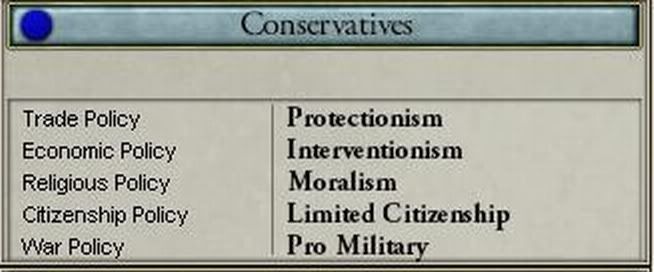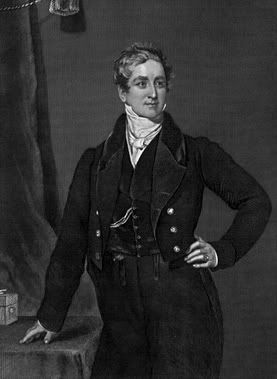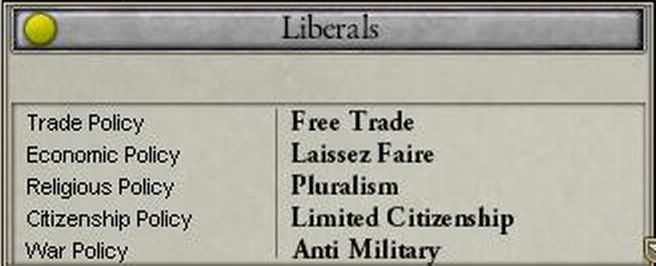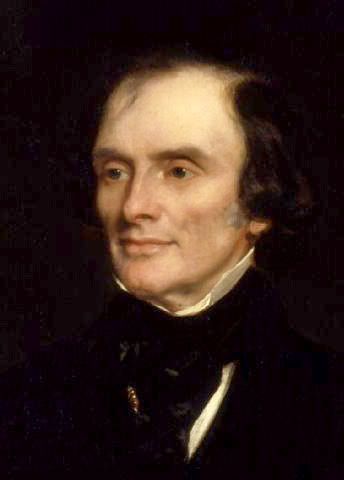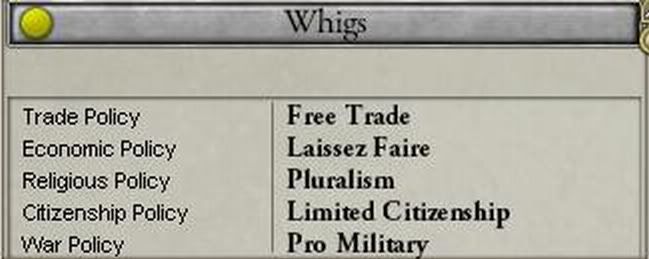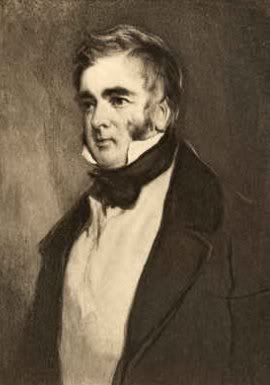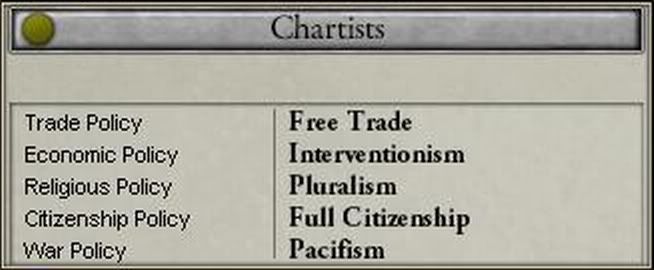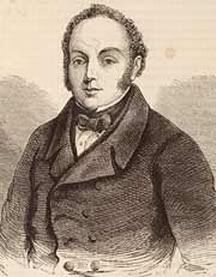The Election of 1847
The near revolution experienced by Britain in 1842 and 1843 had greatly changed British politics. Only one of the three parties that competed the last election had survived intact as both the Radicals and Whigs had split (with the Radical Left becoming the Chartists whilst the Whig Left joined with the rest of the Radicals to found the Liberal Party). Meanwhile, Ireland had been reabsorbed by Britain.
Just as it had prior to the British Revolution and Civil War of the 1830s Ireland was to be represented in Parliament by 100 Members (despite the fact that if seats were appointed according to population the island should have twice that number). Whilst the four mainstream parties competed for votes in Britain, in Ireland special interest parties were left to compete on their own. The Irish Parliamentary Party and the Unionist Party would be left to stand for seats in Ireland.
The Conservative Party (Tories)
For the Conservatives the past government had gone extremely well. Ireland had been reclaimed, the Empire had grown, revolution had been averted and the party had been in government. Meanwhile, the embarrassment of the party’s showing at the 1841 election (in which the Tories finished 3rd) had been somewhat corrected as by 1847 the Tories were the majority partner in the government and the 2nd largest party overall (behind only the Liberal Party in seats).
Party Leader: Sir Robert Peel
In spite of increasing internal pressure to replace him Robert Peel had managed to cling on to the leadership of the Conservative Party. This despite his advocating of free trade, his more lenient stance on the 1843 Strikers and most importantly his failure at the polls in 1841. The one thing he seemed to have going for him was his tremendous relations with the surviving Whig Party.
Policies
Economic:
Over the past government our economy has been stable, even if industrial growth has remained sluggish. The unstable political conditions have greatly disrupted enterprise – we should therefore use government funded encouragement to stimulate investment in new factories.
As this party has always advocated the enterprising citizens should be encouraged in their job producing labour with tax breaks. Taxes can be reduced as a whole through the use of tariffs – a method of balancing the budget that has already proven itself to be very effective.
Political:
The unrest during the last Parliament has proven that policing in the Republic is wholly inadequate. Had the police force been more organised and effective then the rioters would never have got out of control and there would never have been a need to call in troops to restore order. The end result would have saved many lives and avoided the great damage done to the country during that period. It is imperative that we reorganise the police force.
It has also come to the attention of the party that in the aftermath of the unrest on the continent (much more severe than it ever was in Britain) a great many unruly individuals have arrived upon our shores to take advantage of the lack of censorship. This might not be a problem if it was not for the attempts of some individuals to insight rebellion in this country. Against a democratically elected government! Perhaps it would be best if these foreign stokers of revolt are encouraged to move on.
Foreign Policy:
Britain has emerged from the troubles of the 1830s and early 40s a much stronger nation. It is time that we have the pride to stand up to the French. For too long we have shorn the prospect of involvement on the continent through fear. Let us align ourselves fully with Belgium, begin negotiations with Prussia and look to better our position in the court of Spain. If we are too timid to act we will never reclaim our position of dominance.
Beyond Europe we should continue our campaign of expanding our colonial holdings and trading influences. These missions are already reaping great benefits for the homeland.
The Liberal Party
An amalgamation of reformist Whigs and non-Chartist Radicals the centre piece of Liberal policy was the demand for universal male suffrage. It was believed that if Parliament failed to meet this central demand of the workers then there was a genuine chance of another major civil conflict in Britain.
Party Leader: John Russell, 1st Earl Russell
Russell had led the rebellion of almost half of the Whig Party from the government in 1843 and then pioneered the union of the Whig rebels with the remnants of the Radical Party. Russell saw the Liberals as the natural replacement for the Whigs, they continued to advocate many Whig policies but were now committed to continuing political reform.
Policies
Economic:
The market is not the correct sphere for the government to intervene in. We should keep taxes and tariffs as low as we possibly can. This way our enterprising citizens should be free to continue to expand our industries and everyone will be able to buy the goods they demand.
However, the policy of regressive taxation must be ended. We cannot place the heaviest burden of taxation on the poorest citizens – this is highly immoral. Instead a flat tax should be instituted that ensures that all citizens pay the same in tax – no more exemptions for the wealthiest.
Political:
Universal male suffrage!
If our Parliament is not represented by the entire mass of the people then we are no democracy at all. Worse still our government will be doomed to fail. Surely the risings of the 1830s and 1840s should have convinced everyone beyond all doubt that the people are not going to settle for anything short of the vote? If we continue to deny all men this right then we shall tear this country apart.
Foreign Policy:
There is no need to become embroiled in the affairs of the continent – we should refocus our foreign policy to the Far East. So long as we avoid any overly bloody or dangerous confrontations further expansion of the Empire in Asia is both desirable and necessary if Britain’s star is to continue to shine.
Whilst the Americans did not react as hysterically as some feared to the annexation of the Atlantic Republic our relations with them have cooled significantly. It is important that that we improve our relationship with our cousins across the Ocean.
The Whigs
Every single Prime Minister of the British Republic up to 1847 had been a Whig. For 11 years the party had been in government (although never outside of a coalition). No other Party was so experienced in the affairs of government. Yet the troubles of 1842-43 and the subsequent split in the Party had left the Whigs in a precarious position between the Tories and Liberals – where the Whigs could find a relevant position in this newly shaped political system was unclear.
Party Leader: William Lamb, 2nd Viscount Melbourne
After the closure of the 2nd Parliament the previous Whig Party leader and long term Prime Minister Earl Spencer had retired. This left Viscount Melbourne free to replace him. Melbourne had been a major figure within the Whig Party for many years and was the obvious replacement. As the oldest candidate for the Premierships (at 68) his health (as was ever the case with Whig Prime Ministers) risked becoming an issue.
Policies
Economic:
Whig economic policies have served this country well for over a decade and have rebuilt Britain from the ruins of the Civil War. Free Trade and free markets will continue to drive us forward long into the future. The tax cuts for the enterprising have also been a highly successful policy and should not be ended.
Whig economic policies have driven our economy through great successes in the past decade and will continue to do so in the next decade.
Political:
The General Strike of 1843 was not driven by the desire for political reform amongst the workers. It was driven by a mixture of deliberate agitation on the part of certain subversive elements and by harsh economic conditions at the time. There is therefore no need to pass destabilizing reforms that will only weaken the state.
Foreign Policy:
Our isolation from Europe and the expansion of the Empire overseas have acted as the driving forces behind Britain’s revival on the international stage. Now united with our brothers across the Irish Sea we stand in a marvelous position continue to assert our economic and military power in Asia for the benefit of both the homeland and the areas that experience our civilizing influence.
The Chartists
The Chartists are an older movement. Chartism developed in the 1830s as the first mass working class movement in the world. Now by the late 1840s it is the vanguard force of a much wider working class movement in Britain. Support for the anti-war movement in 1842, for the out lash of workers’ anger for the Glasgow Massacre and then the General Strike in 1843 alienated the Chartists from the Westminster mainstream. They were expelled from the Radical Party and most of their members arrested. It is only thanks to the campaigning of the Liberal Party that they movement was allowed to return to the political fold. Now in 1847, for the first time, the Chartists will stand independent candidates across Britain.
Party Leader: Feargus O’Connor
The eccentric Irish leader of the Chartist movement Feargus O’Connor. As the leader of a great rebellion on behalf of Britain’s workers he enjoys tremendous respect across the entire workers’ movement. However, there are fears that the largely liberal agenda of his Chartist movement might clash with the ever growing influence of other workers’ movements – notably socialism. When he met Karl Marx in 1844 (he had fled from the continent in the aftermath of the revolutions) he dismissed him as a ‘’hopeless German mediocrity’’, violently opposed to Communism and disdainful of Socialism O’Connor had already started to grate with the more radical elements of the Chartist movement. However no other figure was so well known and loved by the public within the movement.
Policies
Economic:
The single greatest danger to the workers is unemployment. The unstable nature of the market supported by the Whigs has meant that when large factories have in the past closed many thousands have been left without work for extended periods of time. We should therefore combat this problem in 3 ways:
Firstly subsidies should be provided to keep factories afloat.
Secondly existing factories (with the exemption of arms factories) should have government support for their expansion.
Finally, the government should institute the National Land Plan. The state shall help buy up small plots of land in the countryside from the great estates and these should be provided at low prices to workers. This process would ease the problems of over population in the cities.
In game, whenever unemployment appears I will use a national focus to encourage conversion to farmers – this was an RL scheme of O’Connor which I decided to include.
We should also institute a progressive tax scheme to ensure a steady flow of money from the richest to the poorest.
Political:
Universal male suffrage is a requirement for the survival of this Republic and for any true democracy. At this time we merely have a dictatorship of the propertied and educated.
We should also end all restrictions of Trade Unions – let the workers organize freely!
Foreign Policy:
There is nothing wrong with securing new markets for us to trade in. But let us not sacrifice British lives to secure them.
No war!
The election is now open!
Every reader has one vote and may only vote once per election.
You may vote for:
Conservatives (you may also write Tories)
Liberals
Whigs
Chartists
Please either bold your vote or place it in a separate post to make it easier for me to count them.
Polls shall close at 12 on Thursday.
Good Luck!




